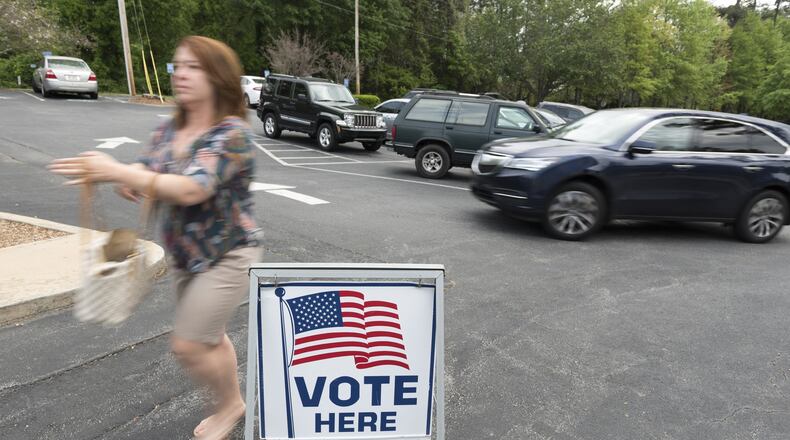The U.S. Justice Department has asked Georgia to explain how it updates and tracks voter registration records as well as removes voters from its rolls who should no longer be eligible to vote.
The Georgia Secretary of State’s Office confirmed it received a three-page letter from the head of the department’s voting section seeking the information as part of a national request under the National Voter Registration Act. At least 44 states are believed to have received the letters, which in some cases also seek data on how many voters were removed from the rolls under a specific time period.
Georgia's letter, however, relates specifically to its policies and regulations. Officials said they are still working on their response and have not yet sent an answer. The department requested the information within 30 days of the letter's June 28 mailing.
The letter coincides with separate requests for Georgia voter data by President Donald Trump's commission on election integrity, which the president formed in May to investigate alleged acts of voter fraud after he made unsubstantiated claims of "millions" of illegal votes being cast during last year's presidential election.
Justice Department officials have said their request is unrelated to the work of the voter fraud panel. Civil rights groups have raised alarms over both, saying they fear the collected information could be used to purge voting rolls and make it harder to register to vote.
"This for a lot of us takes us back to the days when African-Americans went in to vote and they were asked to count jelly beans in a jar, and say how many jelly beans were in the jar before they were given the opportunity to vote," said state Rep. Roger Bruce, D-Atlanta, who with other members of the Georgia Legislative Black Caucus on Thursday sought to reassure voters that they would protect their private information.
Bruce said he was most upset that the voter fraud panel had asked states to provide voters’ voting histories if that information was available.
“Whether you voted as a Democrat or whether you voted as a Republican, why is that relevant to whether or not there was fraud during voting?” Bruce said. “To me, things like that are saying, ‘We want to do something with that information to make sure that we have an advantage whenever the next election comes up — and that the other side has a disadvantage.’”
Election experts across the country have said there is no evidence of any widespread voter fraud. Officials from the Secretary of State’s Office have also said there were no illegal votes cast in Georgia.
Georgia officials said some — but not all — of the requested information is already publicly available under state law for a standard fee of $250. They have requested payment of that fee before the state will process the request. State records show the federal panel is one of 607 entities — others include Harvard University, political parties and private data companies — that have legally sought all or parts of Georgia's public voter data file within the past 18 months.
State law allows information such as voter names, addresses, race and gender, among other data points, to be included on the list. Georgia does not require registration by party, but voters can request party-specific ballots during primary elections — such a request would be noted in the file. Since a voter’s ballot is secret, however, there are no records that show who a voter voted for in any election.
Georgia will not share information considered private under state law such as registered voters’ driver’s license numbers and Social Security numbers.
As for the Justice Department’s questions over how Georgia manages its voter rolls, under state law, registered voters are mailed a confirmation notice following a period of more than three years of “no contact” with election officials. If voters do not respond to the notice within 30 days, they are designated as inactive — something that does not prevent them from voting and does not change their registration status.
If voters then remain inactive for two federal election cycles, meaning they have not voted or had contact with election officials for at least an additional four years, they are removed from voting rolls. This would include voters who have moved to another state or who have died.
A federal judge in March dismissed a lawsuit that claimed the state's "trigger" for contacting voters violated federal voting laws. The Georgia NAACP and government watchdog group Common Cause, which are appealing the ruling, claimed voters have a constitutional right not to vote. The groups said state officials should not demand confirmation of address if they have no reason to believe a voter had moved or died other than that they had not cast a ballot.
U.S. District Judge Timothy C. Batten Sr., however, said the state had taken a "reasonable and nondiscriminatory" approach in trying to reach voters who had not cast a recent ballot to confirm their addresses. Georgia's law had been cleared for use by the Justice Department in 1997.
VOTER DATA REQUESTS
Georgia has received requests for voter data from both the U.S. Justice Department and a commission President Donald Trump appointed to examine election integrity. Some groups have told The Atlanta Journal-Constitution that they are concerned about how that information could be used. Follow our coverage at http://www.myAJC.com/politics.
About the Author
Keep Reading
The Latest
Featured



